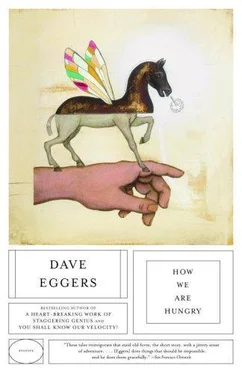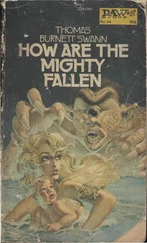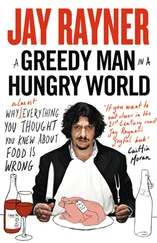Dave Eggers - How We Are Hungry
Здесь есть возможность читать онлайн «Dave Eggers - How We Are Hungry» весь текст электронной книги совершенно бесплатно (целиком полную версию без сокращений). В некоторых случаях можно слушать аудио, скачать через торрент в формате fb2 и присутствует краткое содержание. Год выпуска: 2005, Издательство: Vintage Canada, Жанр: Современная проза, на английском языке. Описание произведения, (предисловие) а так же отзывы посетителей доступны на портале библиотеки ЛибКат.
- Название:How We Are Hungry
- Автор:
- Издательство:Vintage Canada
- Жанр:
- Год:2005
- ISBN:нет данных
- Рейтинг книги:3 / 5. Голосов: 1
-
Избранное:Добавить в избранное
- Отзывы:
-
Ваша оценка:
- 60
- 1
- 2
- 3
- 4
- 5
How We Are Hungry: краткое содержание, описание и аннотация
Предлагаем к чтению аннотацию, описание, краткое содержание или предисловие (зависит от того, что написал сам автор книги «How We Are Hungry»). Если вы не нашли необходимую информацию о книге — напишите в комментариях, мы постараемся отыскать её.
A Heartbreaking Work of Staggering Genius
How We Are Hungry — читать онлайн бесплатно полную книгу (весь текст) целиком
Ниже представлен текст книги, разбитый по страницам. Система сохранения места последней прочитанной страницы, позволяет с удобством читать онлайн бесплатно книгу «How We Are Hungry», без необходимости каждый раз заново искать на чём Вы остановились. Поставьте закладку, и сможете в любой момент перейти на страницу, на которой закончили чтение.
Интервал:
Закладка:
In the morning widening quickly the sun is as clear and forthright as a spotlight and Rita wants to avoid walking past the men. She has already walked past the men twice and she has nothing to say to them. Soon the bus will come to take her and the others to the base of the mountain, and since finally leaving her bed she has been doing the necessary things — eating, packing, calling Gwen — and for each task she has had to walk from her hut to the hotel, has had to walk past the men sitting and standing along the steps into the lobby. Eight to ten of them, young men, sitting, waiting without speaking. Godwill had talked about this, that the men list their occupations as guide, porter, salesperson, anything that will satisfy their government and didn’t require them to be accounted for in one constant place, because there really wasn’t much work at all. She had seen two of the men scuffle briefly over another American’s bag, for a one dollar tip. When Rita walked past them she tried to smile faintly, without looking too friendly, or rich, or sexy, or happy, or vulnerable, or guilty, or proud, or contented, or healthy, or interested — she did not want them to think she was any of those things. She walked by almost cross-eyed with casual concentration.
Rita’s face is wide and almost square, her jaw just short of masculine. People have said she looks like a Kennedy, one of the female Kennedys, the one on TV. But she is not beautiful like that woman; she is instead almost plain, with or without makeup, plain in any light. This she knows, though her friends and Gwen tell her otherwise. She is unmarried and was for a time a foster parent to siblings, a girl of nine and boy of seven, malnourished by their birth mother, and Rita had contemplated adopting them herself — had thought her life through, every year she imagined and planned with those kids, she could definitely do it — but then Rita’s mother and father had beaten her to it. Her parents loved those kids, too, and had oceans of time and plenty of room in their home, and there were discussions and it had quickly been settled. There was a long weekend they all spent together in the house where Rita and Gwen were raised, Rita and her parents there with J.J. and Frederick, the kids arranging their trophies in their new rooms, and on Sunday evening, Rita said goodbye, and the kids stayed there. It was easy and painless for everyone, and Rita spent a week of vacation time in bed shaking.
Now, when she works two Saturdays a month and can’t see them as often, Rita misses the two of them in a way that’s too visceral. She misses having them both in her bed, the two little people, seven and nine years old, when the crickets were too loud and they were scared of them growing, the crickets, and of them together carrying away the house to devour it and everyone inside. This is a story they had heard, about the giant crickets carrying away the house, from their birth mother.
Rita is asleep on the bus but wakes up when the road inclines. The vehicle, white and square with rounded edges — it reminds her vaguely of something that would descend, backward, from a rocket ship and onto the moon — whinnies and shakes over the potholes of the muddy road and good Christ it’s raining! — raining steadily on the way to the gate of Kilimanjaro. Godwill is driving and he’s driving much too fast, and is not slowing down around tight curves, or for pedestrians carrying possessions on their heads, or for school-children, who seem to be everywhere, in uniforms of white above and blue below. Disaster at every moment seems probable, but Rita is so tired she can’t imagine raising an objection if the bus were sailing over a cliff.
“She’s awake!” a man says. She looks to find Frank smiling at her, cheerful in an almost insane way. Maybe he is insane. Frank is the American guide, a sturdy and energetic man, from Oregon, medium-sized in every way, with a short-shorn blond beard that wraps his face as a bandage would a man, decades ago, suffering from a toothache. “We thought we’d have to carry you up. You’re one of those people who can sleep through anything I bet.” Then he laughs a shrill, girlish laugh, forced and mirthless.
They pass a large school, its sign posted along the road. The top half: Drive Refreshed: Coca-Cola; below: Marangu Sec. School. A group of women are walking on the roadside, babies in slings. The bus passes the Samange Social Club, which looks like a construction company trailer. Farther up the road, a small pink building, the K&J Hot Fashion Shop, bearing an enormous spray-painted rendering of Angela Bassett. A boy of six is leading a donkey. Two tiny girls in school uniforms are carrying a bag of potatoes. A driveway leads to the Tropical Pesticides Research Institute. The rain intensifies as they pass another school — Coca-Cola: Drive Refreshed; St Margaret’s Catholic Sec School.
That morning, at the hotel, Rita had overheard a conversation between a British woman and the hotel concierge.
“There are so many Catholic schools!” the tourist had said. She’d just gotten back from a trip to a local waterfall.
“Are you Catholic?” the concierge had asked. The concierge was stout, with a clear nasal voice like a clarinet.
“I am,” the tourist said. “And you?”
“Yes please. Did you see my town? Marangu?”
“I did. On the hill?”
“Yes please.”
“It was very beautiful.”
And the concierge had smiled.
The van passes a FEMA dispensary, a YMCA, another social club, called Millennium, a line of teenage girls in uniforms, plum-purple sweaters and skirts of sportcoat blue. They all wave. The rain is now real rain. The people they pass are soaked.
“Look at Patrick,” Frank says, pointing at a handsome Tanzanian man on the bus, sitting across the aisle from him. “He’s just sitting there smiling, wondering why the hell anyone would pay to be subjected to this.”
Patrick smiles and nods and says nothing.
There are five paying hikers on the trip and they are introducing themselves. There are Mike and Jerry, a son and father in matching jackets. Mike is in his late twenties and his father is maybe sixty. Jerry has an accent that sounds British but possesses the round vowels of an Australian. Jerry owns a chain of restaurants, while the son is an automotive engineer, specializing in ambulances. They are tall men, barrel-chested and thin-legged, though Mike is heavier, with a loose paunch he carries with some effort. They wear matching red jackets, scarred everywhere with zippers, their initials embroidered on the left breast pockets. Mike is quiet and seems to be getting sick from the bus’s jerking movements and constant turns. Jerry is smiling broadly, as if to make up for his son’s reticence — a grin meant to introduce them both as happy and ready men, as gamers.
The rain continues, the cold unseasonable. There is a low fog that rises between the trees, giving the green a dead, faded look, as if most of the forest’s color had drained into the soil.
“The rain should clear away in an hour or so,” Frank announces, as the bus continues up the hills, bouncing through the mud. The foliage everywhere around is tangled and sloppy. “What do you think, Patrick?” Frank says. “This rain gonna burn off?”
Patrick hasn’t spoken yet and now just shrugs and smiles. There is something in his eyes, Rita thinks, that is assessing. Assessing Frank, and the paying hikers, guessing at the possibility that he will make it up and down this mountain, this time, without losing his mind.
Grant is at the back of the bus, watching the land pass through the windows, sitting in the middle of the bus’s backseat, like some kind of human rudder. He is shorter than the other two men but his legs are enormous, like a power lifter’s, his calves thick and hairy. He is wearing cutoff jean shorts, though the temperature has everyone else adding layers. His hair is black and short-shorn, his eyes are small and water-cooler blue. He is watching the land pass through the window near his right cheek, and the wind waters his small calm eyes.
Читать дальшеИнтервал:
Закладка:
Похожие книги на «How We Are Hungry»
Представляем Вашему вниманию похожие книги на «How We Are Hungry» списком для выбора. Мы отобрали схожую по названию и смыслу литературу в надежде предоставить читателям больше вариантов отыскать новые, интересные, ещё непрочитанные произведения.
Обсуждение, отзывы о книге «How We Are Hungry» и просто собственные мнения читателей. Оставьте ваши комментарии, напишите, что Вы думаете о произведении, его смысле или главных героях. Укажите что конкретно понравилось, а что нет, и почему Вы так считаете.












